Replacing the Parking Brake Lever Pawl Spring
If the parking brake lever does not lock in the selected position, first check the pawl spring
If the spring is good, replace the lever.
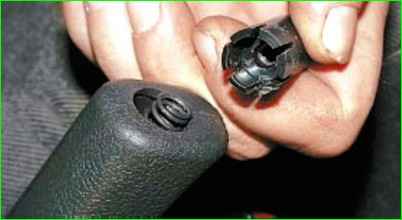
Unscrew the button from the lever
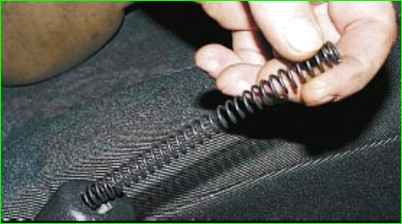
Removing the pawl spring.
Replacing the defective spring
Repairing the parking brake lever
Installing the car on a lift or inspection pit
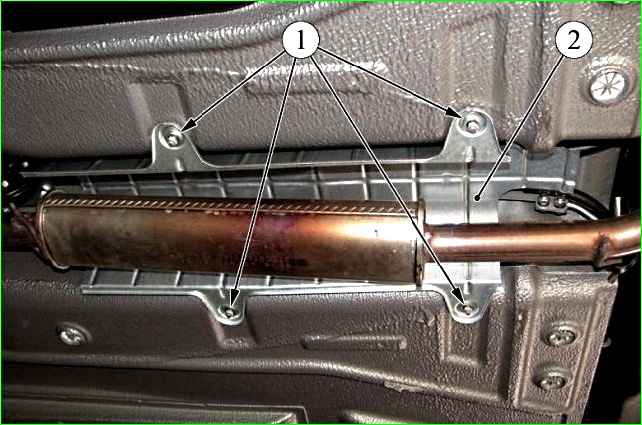
Unscrew the four nuts 1 from underneath the car, fastening the body floor protection, remove the spring and flat washers.
Disengage the screen 2 from the fastening studs and move it forward in the direction of vehicle travel, thereby freeing up space for the elements of the hand brake drive system.
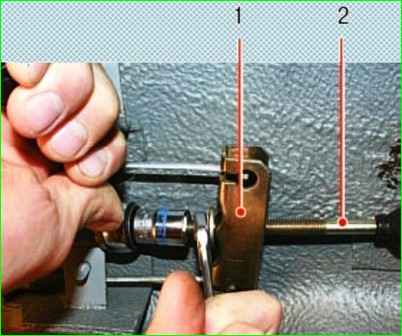
From underneath the car, use a 13 mm wrench to unscrew the lock nut and adjusting nut of the parking brake and remove equalizer 1 with rod 2.
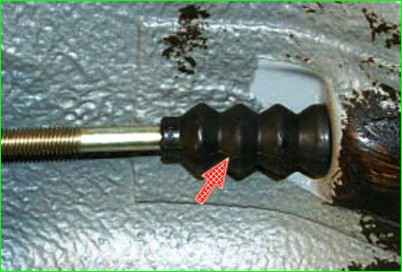
Remove the protective cover from the hole in the floor and remove it from the rod.
Repair of the parking brake lever
You will need: two 13 mm wrenches, a 13 mm socket wrench (head), a Phillips-head screwdriver, and pliers.
From inside the passenger compartment, unscrew the front mounting screw of the parking brake light switch bracket. brakes.
Please note that the ground wire of the switch is secured with a screw.
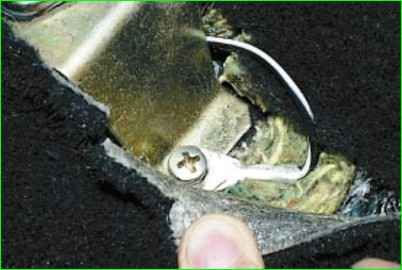
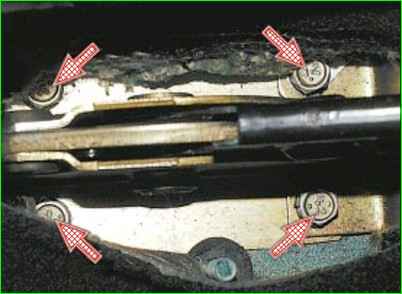
Using a 10 mm wrench, unscrew the four parking brake lever mounting bolts (the two front ones also secure the switch bracket).
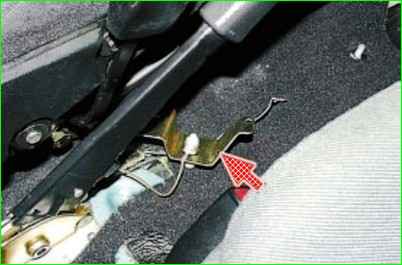
Put the bracket with the switch aside.
Remove the parking brake lever by removing the rod from the hole in the floor.
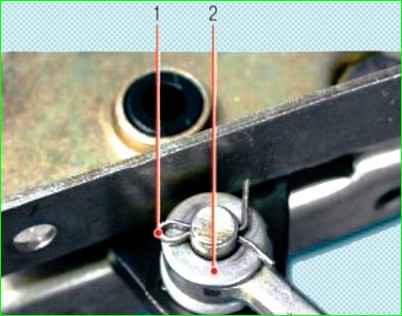
To replace the rod, remove the cotter pin 1 and remove the washer 2.
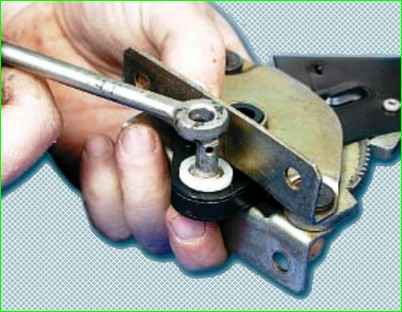
Remove the rod from the axle.
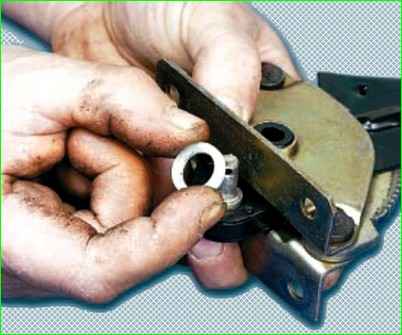
Replace a worn or cracked plastic bushing.
Assemble and install the parking brake lever in the reverse order of disassembly.
After installing the lever, adjust the parking brake
Replacing the parking brake cable
If the cable removed from the car moves with difficulty in the sheath, lubricate it, pour transmission or engine oil into the sheath until it begins to flow out from the opposite end of the sheath.
During the pouring process, periodically move the cable in the sheath.
Install the cable with an assistant: the lever rod is short, so to install the equalizer, you need to pull the cable tightly.
Replace the cable if the following faults occur:
- – the cable ends are loose;
- – the cable threads have started to break;
- – the cable moves with difficulty in the casing even after lubrication.
You will need: a 10 mm wrench, two 13 mm wrenches, and a large screwdriver.
Lower the parking brake lever all the way down.
Remove the brake drum of the corresponding wheel.
Remove the muffler from the suspension mounts and the resonator from the rear mount.
Lower the exhaust system down.

Using a 13 mm wrench, loosen the lock nut and adjusting nut of the parking brake and remove equalizer 1 from rod 2.
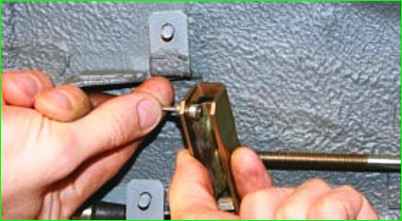
Remove the cable end from equalizer.
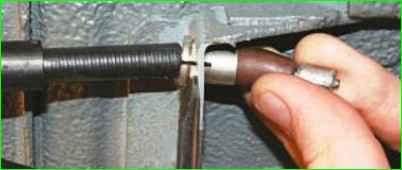
Remove the end of the cable sheath from the bracket on the body.
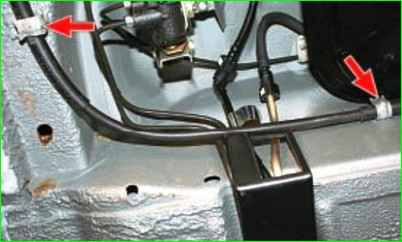
Bend back the two brackets securing each cable.
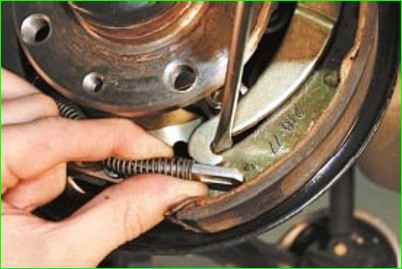
Insert a screwdriver between the shoe and the parking brake lever, move the lever forward and disconnect the cable end from the lever.
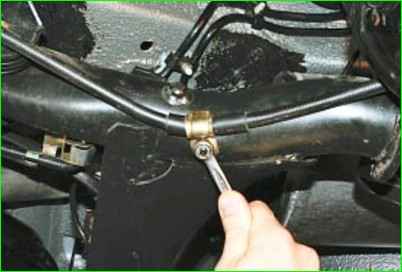
Loosen the nut securing the cable holder to the rear axle beam and remove the cable from the holder.
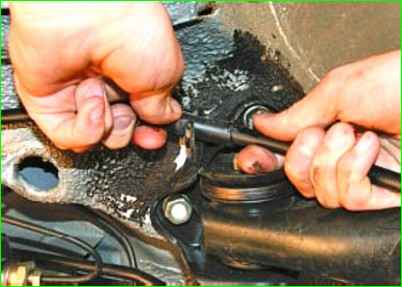
Remove the cable from the bracket on the body
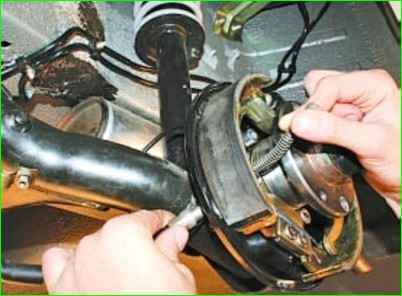
Remove the cable from the brake shield.12. Install the cable in the reverse order of removal.
Note that the cables are installed in the bracket crosswise.
After installation, adjust the parking brake
Some drivers, trying to reduce wear on the parking brake cable, try to use it less often.
Such "savings" lead to a bad result: the cable, rarely moving in the sheath, gradually loses mobility and eventually jams and breaks.
Use the parking brake in all cases when it is necessary.





